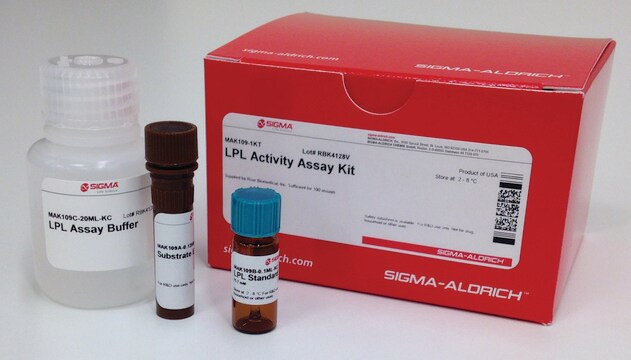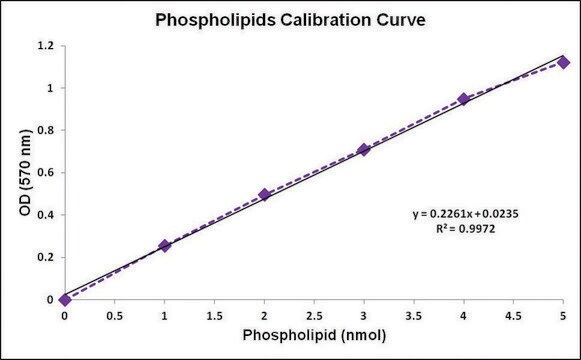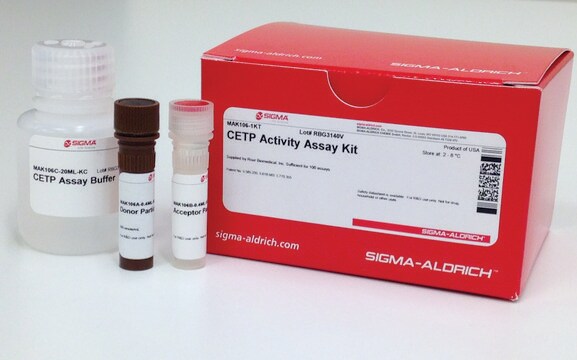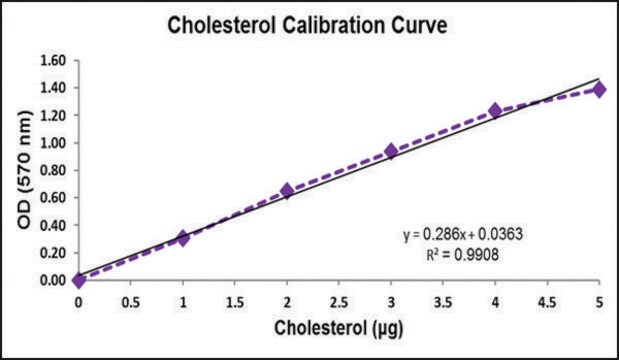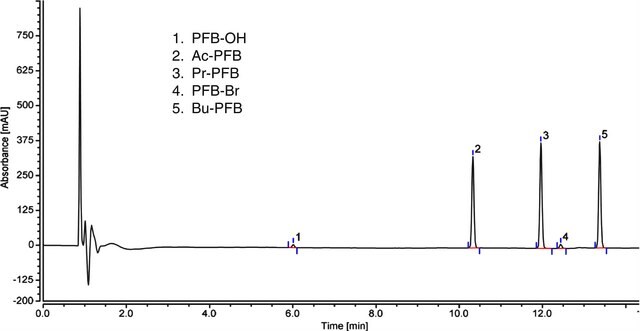MAK108
PLTP Activity Assay Kit
Supplied by Roar Biomedical, Inc.
Sinonimo/i:
Phospholipid transfer protein activity assay kit
Autenticatiper visualizzare i prezzi riservati alla tua organizzazione & contrattuali
About This Item
Codice UNSPSC:
12161503
NACRES:
NA.84
Prodotti consigliati
impiego
sufficient for 100 fluorometric tests
applicazioni
pharmaceutical
Metodo di rivelazione
fluorometric
Malattie correlate
cardiovascular diseases
Temperatura di conservazione
2-8°C
Informazioni sul gene
human ... PLTP(5360)
Categorie correlate
Descrizione generale
Phospholipid transfer protein (PLTP) is a protein present in normal human plasma. PLTP transfers phospholipids among lipoproteins in plasma.
Compatibilità
Suitable to determine Phospholipid transfer protein (PLTP) activity in plasma or serum (fresh or frozen) as well as other sources of PLTP.
Principio
The PLTP Activity Assay Kit includes proprietary substrates to detect PLTP mediated transfer of fluorescent substrate. Transfer activity results in increased fluorescent emission intensity (λEx = 465 nm/λEm = 535 nm) from the assay.
Risultati analitici
Codice della classe di stoccaggio
10 - Combustible liquids
Scegli una delle versioni più recenti:
Possiedi già questo prodotto?
I documenti relativi ai prodotti acquistati recentemente sono disponibili nell’Archivio dei documenti.
Natacha Bellanger et al.
Arteriosclerosis, thrombosis, and vascular biology, 31(7), 1675-1681 (2011-04-30)
Low high-density lipoprotein (HDL) cholesterol levels are frequently observed in familial hypercholesterolemia (FH) and might be associated with functional alterations of HDL particles that may influence their efficaciousness in the reverse cholesterol transport pathway. We evaluated key steps of the
Alexina Orsoni et al.
Journal of lipid research, 53(4), 767-775 (2012-02-18)
In familial hypercholesterolemia (FH), low HDL cholesterol (HDL-C) levels are associated with functional alterations of HDL particles that reduce their capacity to mediate the reverse cholesterol transport (RCT) pathway. The objective of this study was to evaluate the consequences of
Ryan J Henderson et al.
Drug development and industrial pharmacy, 35(9), 1139-1146 (2009-04-22)
To investigate how different formulations of Amphotericin-B (Amp-B) affect the activity of phospholipid transfer protein (PLTP) when incubated with hyperlipidemic and normolipidemic plasma at physiological temperature (37 degrees C). Six hyperlipidemic and six normolipidemic plasma samples were collected and tested
Sander J Robins et al.
Atherosclerosis, 228(1), 230-236 (2013-03-13)
Cholesteryl ester transfer protein (CETP) and phospholipid transfer protein (PLTP) are two genetically-related plasma proteins involved in the exchange of cholesteryl esters and phospholipids between high-density lipoproteins (HDL) and other lipoproteins. Although low CETP and high PLTP activity both result
Marta Marchesi et al.
British journal of pharmacology, 164(5), 1460-1468 (2011-04-14)
Besides a significant reduction of low-density lipoprotein (LDL) cholesterol, statins moderately increase high-density lipoprotein (HDL) levels. In vitro studies have indicated that this effect may be the result of an increased expression of apolipoprotein (apo)A-I, the main protein component of
Il team dei nostri ricercatori vanta grande esperienza in tutte le aree della ricerca quali Life Science, scienza dei materiali, sintesi chimica, cromatografia, discipline analitiche, ecc..
Contatta l'Assistenza Tecnica.